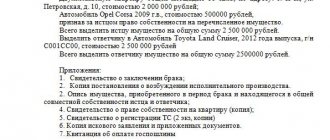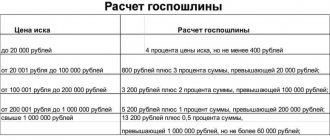The concept of joint property of spouses
Before understanding the types of regime for joint property of spouses, it is necessary to understand what joint property of spouses is.
In accordance with Part 1 of Art. 34 of the RF IC, property acquired by them during marriage is recognized as joint property of spouses.
What kind of property acquired during marriage does the legislator recognize as joint (part 2 of article 34 of the RF IC)?
- any income (from labor, intellectual and entrepreneurial activities)
- pensions, benefits and other payments that do not have a specific purpose (for example, maternity capital is a targeted payment and is not subject to division);
- movable and immovable things;
- securities, shares, shares in the capital of credit institutions and other commercial organizations;
- other property acquired during marriage, regardless of which spouse it was acquired in the name of and/or which spouse contributed funds.
What is subject to division
All property acquired jointly by spouses during their marriage is subject to division. It does not matter in whose name the specific property was acquired. Thus, the following are subject to division:
- First of all, all material resources earned by both spouses in the course of labor and business activities, including those contained in bank accounts . If one of the spouses did not work, doing housework or having another good reason for this, the money that the working spouse earns is still considered jointly acquired (except for cases where the parasitism of the second spouse can be proven in court).
- Movable and immovable property purchased during marriage using jointly acquired funds . This includes not only real estate, vehicles, household appliances, but also securities, shares, shares and deposits in commercial organizations.
- Property acquired by one of the spouses before marriage, but requiring significant material investments during the marriage . If spouses invested jointly acquired funds in certain property purchased before marriage, the principles of its division are determined by the court on an individual basis. An example is an apartment purchased by one of the spouses before marriage, in which major repairs or reconstruction were made during family life.
Car section
Any vehicle purchased during family life is considered jointly acquired property and is subject to division, with the exception of cars purchased with donated, won or inherited money. Since it is impossible to divide the car equally without violating its integrity, most often during the trial a decision is made that the car goes to one of the spouses, and the other receives monetary compensation. In some cases, half of the car is compensated by the value of other property transferred to the second spouse. If preference is given to the option of monetary compensation, the payment amount is equal to 50% of the estimated value of the vehicle. The total cost is determined based on the results of an independent assessment, which is paid by the spouses.
Such a decision often causes disputes between spouses regarding who will get the car and who will receive compensation. Judicial practice shows that more often the court gives preference to the spouse who used the car more often. This can be confirmed by receipts and invoices for the maintenance and servicing of the car, witness statements, etc.
Division of commercial property
The process of dividing jointly acquired commercial property, which is the source of income for one or both spouses, is especially difficult. It should be understood that any income received by spouses during marriage is considered jointly acquired and is subject to division. The same applies to business, share of authorized capital in an institution, block of shares, etc.
The division of commercial property according to the law follows general principles. This means that shares in the business are divided equally, regardless of the form of business - one of the spouses is a private entrepreneur or the founder of a commercial organization. The section can be carried out in three ways:
- Division of the spouse's share in the business in kind - this means that the second spouse is given half of the shares, share of the authorized capital, company property, etc. In fact, this option is implemented extremely rarely, since such a division mechanism often impedes the further functioning and development of the enterprise.
- One of the spouses becomes the full owner of the business - to implement this option, the second spouse must be paid compensation equal to half the market value of the commercial property. To determine the market value, you will have to resort to an independent examination.
- The business is sold, and the proceeds are divided in half - if the spouses fail to divide commercial property while preserving it, the court will decide to sell the business and divide the material assets.
Legal regime of marital property
This regime applies not only to the division of property after the termination of marriage, but also during marriage. This regime determines the procedure for ownership, use and disposal of joint property, which property is considered joint property and which is not, in accordance with the law.
When dividing, the spouses’ shares in the entire amount of property are recognized as equal
, and all jointly acquired property is simply divided in half (Part 1 of Article 39 of the RF IC).
The law allows you to deviate from equality of shares in marital property under the following circumstances (Part 2 of Article 39 of the RF IC):
- if the interests of minor children require it;
- if one of the spouses did not have income for unjustified reasons;
- if one of the spouses spent common property contrary to the interests of the family.
The allocation of shares and division of property under the legal regime is carried out by the court
(Article 38 of the RF IC).
AGREEMENT
on the division of jointly acquired property of spouses
We, __________________, ____________ year of birth, gender male, citizenship of the Russian Federation, registered at the address: _________________________ passport series ___ No. _______ issued on ___________ year by the District Branch ____________ of the Federal Migration Service of Russia for the city _______ in the Northern Administrative District code of division _______ and ______________________, __________ year of birth, gender female, citizenship of the Russian Federation, registered at the address: ________________, passport series _____ No. ______ issued __________. Department of Internal Affairs “______”, ______, married since _________, hereinafter referred to as “Parties” for the purpose of dividing the common property acquired during the marriage and in accordance with Art. 38 RF IC have concluded this Agreement as follows:
SUBJECT OF THE AGREEMENT
In accordance with Art. 38 of the Family Code of the Russian Federation, the “Parties” agreed, by mutual consent, to divide the common property of the spouses acquired by them during the marriage in the manner prescribed by this agreement.
1. GENERAL PROVISIONS
1.1. Property acquired by the Spouses during the marriage is the joint property of the Spouses, with the exception of property owned by law by one of the Spouses, and with the exception of cases provided for in this Agreement.
1.2. In the event of divorce, all property acquired during the marriage is considered the common property of the Spouses and is subject to legal treatment, unless otherwise provided by this Agreement.
1.3. The “Parties” state that at the time of concluding this Agreement, the property listed in clauses. 2.1. Agreement, is, in accordance with Art. 34 of the Family Code of the Russian Federation, their joint property acquired during marriage.
1.4. The “Parties” confirm that before the conclusion of this Agreement, the property specified in it has not been sold to anyone, has not been pledged, is not in dispute or under arrest, and also that they are not limited in their legal capacity, are not under guardianship or trusteeship, due to health reasons can independently exercise and defend their rights and fulfill their obligations, do not suffer from diseases that prevent them from understanding the essence of the agreement being signed, that they do not have circumstances forcing them to complete this transaction on extremely unfavorable terms for themselves, that the terms of this agreement do not put any of them in extreme unfavorable situation.
2. PROPERTY ACQUIRED DURING THE MARRIAGE AND IS THE JOINT PROPERTY OF THE SPOUSES
2.1. Agreement No. ______ dated ___________ was concluded between LLC “________”, hereinafter referred to as the “Developer”, represented by the General Director _________________ and _______________, hereinafter referred to as the “Shared Construction Participant”. According to clause 2.1 of the Agreement, the Developer undertakes, on its own, or with the involvement of other persons, to carry out the construction of an apartment building at the construction address: ________________________________ and transfer the shared construction object described above to the shared construction participant, and the shared construction participant undertakes to pay the price stipulated by this Agreement and accept the shared construction object construction.
3. LEGAL REGIME OF A SEPARATE TYPE OF PROPERTY
3.1. In the procedure for dividing the common property of the spouses, the parties established that the ownership of ___________ would be an apartment with a total area of ____ sq. m. m, located at: _______________________________________
3.2 ____________ towards the cost of the apartment pays money to _____________ in the amount of ½ share of the cost of the apartment, namely ____________ rubles by transfer to Account No._____. within fourteen days from the date of conclusion of the Agreement.
4. ADDITIONAL CONDITIONS
4.1. In pursuance of this Agreement, the “Parties” undertake to take the actions necessary to formalize, in accordance with the requirements of the current legislation of the Russian Federation, their rights to the property transferred to each of the “Parties” in accordance with this Agreement.
4.2. The “parties” agreed to consider the property divided in accordance with the terms of this agreement to be of equal value.
4.3. After concluding this Agreement and fulfilling all its requirements, the “Parties” do not have any property or financial claims against each other in relation to the property specified in the Agreement.
5. FINAL PROVISIONS
5.1. This Agreement comes into force from the moment it is signed by the “Parties”.
5.2. This Agreement is drawn up in Russian in two copies, one for each of the “Parties”. signatures of the parties
(_______________) __________________________________________________________________ (___________________)
.
If it comes to trial, the whole process will be divided into three main stages:
1. Stage No. 1 Preparation and collection of documents . Since the court during the hearing adheres to the principle of equality of parties in relation to joint property, you should first of all collect documents confirming the fact of acquisition of movable and immovable property during marriage. If one of the parties does not agree with the division according to the 50/50 principle, it should provide the court with documents confirming the possibility of deviating from the principle of equality. This can happen if the family has minor children living with one of the spouses, one of the spouses has not worked for a long time without good reason, etc.
2. Stage No. 2 Preparation and submission of a statement of claim . The claim to the court must be drawn up in accordance with all the requirements and norms of the law. It is very important in the statement of claim to clearly describe the current situation and indicate the amount that the plaintiff demands to recover in his favor. Also at this stage it is necessary to pay a state fee, the amount of which is determined by the price of the claim. Also, the statement of claim must be accompanied by a package of documents confirming the rights of the spouses to division, and indicate the norms of legislation according to which this statement of claim has legal force.
3. Stage No. 3 Court hearing . During the court hearing, each party must express its position on the case and support it with documentary evidence and testimony. To achieve the desired result, it is better at this stage to resort to the services of a professional lawyer. A court decision can always be appealed.
Contractual regime of spouses' property
As the name implies, this regime applies if there is an agreement between the spouses. That is, the procedure for regulating the regime of joint ownership, property rights and obligations in marriage, and upon its dissolution, are determined by the marriage contract.
Marriage contract
must be in writing and notarized. It can be concluded before the marriage is registered and at any time during the marriage. A marriage contract can be concluded both in relation to existing property and in relation to future property (Article 41 of the RF IC).
This document may establish
(Article 42 of the RF IC):
- regime of joint, shared or separate property of spouses;
- regime of all property of spouses and/or only part of it and/or certain types of property;
- property regime of each spouse;
- order of mutual content;
- ways to share in each other's income;
- the procedure for bearing expenses by each spouse;
At the same time, the rights and obligations established by the marriage contract may be limited by time limits, or made dependent on the occurrence and/or non-occurrence of certain conditions.
After divorce, spouses can enter into an agreement on the division of property
, if they have not previously entered into a marriage contract. Such an agreement will be essentially similar to a prenuptial agreement in almost all respects, except for the ability to resolve property issues for the future.
When a divorce occurs in the registry office
When a divorce occurs by agreement of the parties, the couple does not have children together, and the parties do not plan to divide property, they simply go together to the registry office at their place of residence and fill out an application form using a special form, where they report in writing their joint intention to end their marriage . Spouses do not need to enter into any additional agreements.
But even when both agree to a divorce and nothing prevents them from filing a divorce through the registry office, it happens that the husband or wife cannot visit this office and write a statement in person. The reasons may be quite valid (illness or long-term departure), or they may simply be expressed in the reluctance to see the ex-spouse. In such a situation, one of the spouses, who cannot or does not want to go and write a statement together, can draw up and sign a divorce agreement and send it to the registry office for consideration.
A month after applying for divorce, by agreement of the parties, it will be possible to obtain a divorce certificate, which is issued in two copies, one for each of the former spouses.
Division of marital property using an example of a specific situation
Now let’s move from theory to practice and look at a specific example of how the division of spouses’ property occurs.
Suppose spouses who have a private house and land divorced and then decided to divide the property. If a marriage contract was concluded between the spouses, then the division of property occurs in accordance with the terms of this contract.
If a marriage contract has not been concluded, then two options are possible:
- conclude an agreement on the division of property and set out conditions that suit both parties;
- go to court if you cannot agree on the division of property.
There is another option - sell your existing property and split the money in half
. This is the easiest and fastest way to put an end to the issue of dividing jointly acquired property, if there is little of it.
What cannot be divided
There is also a category of property that is not subject to division and is considered the personal property of one of the spouses:
- Any property that was acquired by one of the spouses as a result of a paid or gratuitous transaction before entering into an official marriage.
- Property received during marriage, but transferred to one of the spouses under a gratuitous agreement - inheritance, winnings, gift agreement.
- Any official and municipal property, as well as housing rented under a commercial lease agreement, is not considered the property of the spouses, and therefore cannot be subject to division.
- Personal items – clothing, cosmetics, etc. In some cases, expensive jewelry is subject to division if the spouse can prove that it was purchased with joint funds.
- The result of the intellectual activity of one of the spouses.
- Indivisible things (for example, a room is considered indivisible, while a house can be divided between spouses).
- Complex things necessary for one of the spouses to conduct professional activities and make a profit (for example, a sewing machine for a seamstress, a computer for a programmer, etc.).
- Property purchased using marital assets acquired jointly and registered in the names of the children.
- Property designated as the property of one of the spouses by the terms of the marriage contract.
Division of inherited property
According to Article 36 of the Family Code of the Russian Federation, any property received by one of the spouses as an inheritance is not subject to division and is considered the property of the recipient. The same rules apply to gifts and winnings, which, like an inheritance, are received as a result of a gratuitous transaction. The only case when inherited property can be divided is voluntary division. Then the owner can voluntarily transfer part of the inheritance to the spouse. However, the recipient should understand that if after some time the heir changes his mind and wants to return the transferred part of the inheritance, the court will be on his side.
Division of property in court
If the spouses were unable to reach an agreement and a dispute arose, then in this case the division will be carried out by the court
.
One of the spouses (former spouses) files a statement of claim with the court, in which he indicates his desired option for dividing the joint property. And here again you can find a compromise and conclude a settlement agreement.
Let's assume that the spouses have reached an agreement and entered into a settlement agreement. In this case, if its terms comply with the law, then the court approves this agreement and terminates the proceedings. The terms of the agreement are contained in the court ruling, which, of course, is also a judicial act, so it must be executed. This means that if one of the spouses decides not to comply with the terms of the agreement, the other can go to court
for the issuance of a writ of execution and to the bailiff service for the enforcement of the terms of the settlement agreement enshrined in the judicial act.
What financial costs await the parties with this option?
The spouse who filed the claim paid the state fee for the judicial review
. Its size depends on the amount of the claim (Article 333.19 of the Tax Code of the Russian Federation). Usually, when filing a claim, they are guided by the cadastral value of the property, and the amount of the state duty is calculated from this amount. The maximum possible amount of state duty is 60,000 rubles. The parties may also incur legal costs. When concluding a settlement agreement, the parties usually do not reimburse each other for legal costs, but this point can also be discussed and divided in half.
If a writ of execution was received and enforcement proceedings were initiated, and the debtor in the enforcement proceedings did not fulfill the terms of the agreement within the period specified by the bailiff (usually 5 days), an enforcement fee in the amount of 7% of the amount of the claim will be collected from him.
However, our spouses could not agree and continue the trial
. In this case, to make a decision it will be necessary to evaluate the property, and the court will appoint an appropriate examination.
The parties may try to persuade the court to deviate from equality of shares, although this is how property is to be divided in accordance with the law. This is quite difficult to do, although the law allows deviations from equality of shares, but the courts, for the most part, refuse such requirements.
What legal costs will the parties bear under this option?
- payment of state duty by the plaintiff;
- if the defendant files a counterclaim (its own version of the division of property), then it will also pay the state fee, but in a smaller amount (Article 333.20 of the Tax Code of the Russian Federation);
- payment for legal services (drawing up documents and representation in court);
- payment of state fees for registration actions when registering the division of property in Rosreestr.
So, the trial ended, each spouse received 1/2 shares in the ownership of the house and land.
That is, the division took place only on paper
. In real life, strangers are forced to “share” real estate. If the house is large enough and the layout allows it, then you can determine the procedure for using both the house and the land (in case of a dispute, go back to court). It’s not hard to imagine what life would be like side by side with your former “other half.”
Division through court
If the issue of property division cannot be resolved voluntarily, each spouse has the right to go to court. When considering cases of division of property, the court will be guided by the following principles:
- Spouses are given equal rights to the possession of all property assets acquired during the marriage.
- If during the court hearing the parasitism of one of the spouses is proven, the court may decide on an unequal division in favor of the working party.
- If, to acquire any item of movable or immovable property, one of the parties used their own funds received by inheritance, being a win or a gift, or pre-marital accumulation, priority is also given to this spouse. An apartment, for example, in this case will be divided into unequal parts.
- If there are children in the family, during the division the court may take into account their interests, making an unequal division in favor of the party with whom the child lives.
During the division, two main mechanisms are used - the transfer of items of equal value to the spouses or monetary compensation, which is due to the one who received a lesser amount of property during the division.
If the spouses do not divide the property after the divorce, it is still considered community property. This means that both spouses own and can use everything that was acquired during family life. This mechanism is often chosen by couples who were able to maintain good relationships and trust in each other after a divorce. At the same time, the procedure for dividing property can begin at any time. However, experts recommend not to put this matter off for a long time, since compensation for items is calculated in the market value of the assets today. Most items of movable and immovable property lose a certain percentage of their value every year.
Speaking about deadlines, it is important to understand that when dividing property, it is always beneficial for one of the spouses to delay the process, since a statute of limitations will apply to part of the property. Usually the entire sectioning procedure lasts only a few months, but sometimes the process can be extended. This happens especially often if spouses have joint commercial property. You can speed up and simplify the process of dividing property by engaging an experienced lawyer.
Choosing an option for dividing property
The above example of possible options for dividing property clearly shows that the most profitable option is any compromise.
Of course, it is good if people were able to agree upon marriage and draw up a marriage contract. Of course, this is not a panacea. A marriage contract can also be challenged if one of the spouses considers that the conditions in the changed situation are no longer beneficial for him.
Litigation is long, expensive and not always satisfying
. Even ex-spouses can come to an agreement and do without an arbiter in the person of the judiciary, but decide everything on their own and come to exactly the result that suits both parties.
An example from judicial practice
Citizen K. filed a claim in court regarding the division of property with her ex-husband, citizen V. The plaintiff demanded an equal division of the three-room apartment that she and her husband purchased three years ago. The defendant did not agree to such conditions, claiming that the apartment was purchased with his personal funds.
During the court hearing, it was found out that a year before purchasing a three-room apartment, the husband sold a one-room apartment, which was given to him by his parents before marriage. The husband argued that it was this money that was used as fixed capital for the purchase of family housing. However, the plaintiff was able to confirm that the cost of a three-room apartment is twice as much as the cost of a one-room apartment, which means that half of the funds for the purchase are their jointly acquired property.
According to the court decision, the wife was awarded one quarter of a three-room apartment. The court justified its decision by the fact that half of the apartment was purchased with the spouse’s personal funds and cannot be subject to division. The second half can be considered jointly acquired, and accordingly divided in half. Thus, the spouses decided that the husband would live in the apartment, paying the ex-wife compensation in the amount of the market value of one-fourth of the three-room apartment.
State duty
The amount of state duty at a notary when dividing property of spouses is fixed at the legislative level. The amount of the amount is regulated by Article 333.24 of the Tax Code of the Russian Federation. The amount of state duty directly depends on the value of the property. The more expensive the property that is subject to division, the more money the spouses must transfer as a tax fee. The value of the divisible property specified in the agreement is summed up. The state duty is calculated based on the total price of all real estate objects included in the contract (Article 333.24 of the Tax Code of the Russian Federation).
The legislation establishes maximum and minimum fees for dividing property from a notary. Husband and wife must pay at least 300 rubles. The maximum amount of state duty is 20,000 rubles.
Required documents
The notary must ensure that the property to be divided actually belongs to the spouses and was acquired during marriage. Therefore, the husband and wife must provide the appropriate package of documents. The list of official papers is not fixed in the current legislation. The list of documents may vary depending on the type of property to be divided by the spouses at the notary. If it is necessary to differentiate the rights of a husband and wife to a real estate property, you will need:
- purchase and sale agreement, share participation agreement or other papers confirming the fact of purchase of an apartment or house;
- extract from Rosreestr;
- cadastral and technical passport.
The given list of documents is not exhaustive. The notary may request additional documentation from the spouses when dividing property, if it is necessary to clarify any data. When movable property is subject to division, the following papers may be required:
- contract of sale;
- checks and receipts;
- technical certificate.
Please note
Regardless of the type of property, the husband and wife must provide the notary with an identification document and a pre-filled agreement on the division of property. If spouses are afraid of making a mistake when preparing documents, you can contact a specialist at a notary’s office in advance and use the service of filling out the document.








